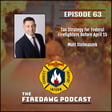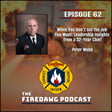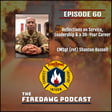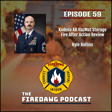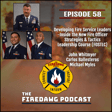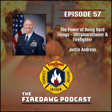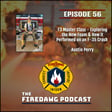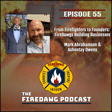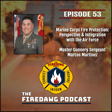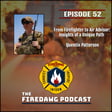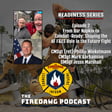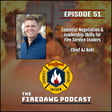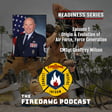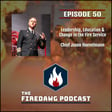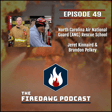Introduction to Episode 54 and Guest
00:00:00
Speaker
Welcome, my name is Chris Boikley and thank you for joining us on episode 54 of Fire Dog Podcast. In this episode, I have the privilege of speaking with Chief Warrant Officer Justin Barnes.
00:00:16
Speaker
welcome my name is chris boykeley and thank you for joining us on episode fifty four of the firedog podcast and this episode i have the privilege of speaking with chief war officer justin barnes Over the past two decades, he served around the world from combat missions in Iraq and Afghanistan to shaping thousands of Marines as a drill instructor to earning national recognition as the 2022 DOD military fire officer of the year.
Barnes' Military Experience and Mentoring Role
00:00:44
Speaker
Today, he continues to mentor the next generation of leaders as the Marine Corps liaison officer at the Joint Fire Protection Academy in San Angelo, Texas. Chief, we are glad to have you on our podcast.
00:00:56
Speaker
Oh, it's great to be on. i appreciate it. Man, let's dive right in. will you hit us with a little bit of your background? Tell us about, uh, what motivated you to join the Marine Corps back in 2002 and some of the the high points of your career to this point.
00:01:10
Speaker
Absolutely. Uh, I'll, I'll be honest. I didn't intend on joining the military, uh, after high school, i had no idea what I wanted to do.
00:01:21
Speaker
And, um, Uh, it seemed as if people around me, my, my close friends, uh, social network, everybody had a plan. Everybody kind of had ambition.
00:01:32
Speaker
Um, they, they had a direction and, uh, really didn't, I didn't, I wasn't really into, to anything, um, after high school.
Joining the Marines: A Leap of Faith
00:01:41
Speaker
And, uh, so, and the military wasn't even one of those options. I didn't see that as as a choice of mine, um, until a buddy of mine had said, uh,
00:01:51
Speaker
Well, if you don't know where you're going, just think about the military. And I, I, I was like, yeah, I guess, you know, I maybe, um, and after I talked to a few of the branches, ah I figured if I was going to challenge myself, I would, uh, I would choose what I thought was the most challenging, um, at the time. And I, it could have been anything. It could have been any of the, any of the services.
00:02:19
Speaker
Uh, cause they're all challenging, but, but this one to me at the time, at least the way the guy sold me on it was, was, was more challenging. So I took it. Um, yeah. and And here I am, know, a couple of decades later, you didn't start out in fire protection, right?
00:02:35
Speaker
You started with, no, I didn't. Yeah. Right.
From Fuel Specialist to Firefighting
00:02:38
Speaker
I started off as a bulk fuel specialist, um, dealing with, you know fuel storage, fuel transportation, um, They did long, long distance, um, transfers. They did, uh, fuel farms.
00:02:52
Speaker
Uh, we had these, you know, the big gas trucks that you see on the road, you know, camouflaged. Um, they've since changed a lot over the years, but, uh, when I got it, when I got in, they were still the stick shift, stick shift trucks. So what what led to firefighting?
00:03:14
Speaker
a lot of things. So I did four years active duty and then, uh, uh, you know, deployment, uh, overseas tour. Um, and, I ended up getting out of the Marine Corps. I, I, i got my DD two 14 and I was out.
00:03:29
Speaker
Didn't, you know, didn't just want to do four, do something else. Um, and then I, it was about 2007, seven ish, the, the Marine Corps started to plus up their numbers. Um, this, I, I don't want to misspeak, but I believe it was right around when, the U S was going into Iraq and Afghanistan at the same time. Uh, they were doing some plus up type stuff.
00:03:55
Speaker
And, um, and a lot of my friends had gotten recalled off of, uh, you know, in the, in the reserve. And, uh, cause you do four years on the inactive reserve side as part of an eight year contract.
00:04:08
Speaker
And, uh, I thought, you know, i I'll come back in you know, ah if i'm not I don't want to get recalled and do something I don't want to do. And so I got I went and saw the recruiter and he he said, well, what do you want to do? Because your your job field is closed.
00:04:24
Speaker
And, uh, my previous job. So i was like, man, said, well, give me three choices. And so I was, I told him engineers that that's something I could probably use. Um, EOD that they were always the cool kids.
00:04:38
Speaker
Um, you know, ah and, and, uh, and then I was, I said, what else do you, what else do you need? You know? And he said, well, firefighting has some, some spaces open. And I was like, sure, put it, put it on there. And, uh, but in that order.
00:04:51
Speaker
And so. ah he He called me the next day and he said, Hey, I i got a, I got a spot for you with fire. Yeah. So, um, that back in and yeah,
00:05:04
Speaker
well, it was in the cards, ah but, uh, yeah.
Responsibilities of a Chief Warrant Officer
00:05:09
Speaker
So now as a chief warrant officer, there's all kinds of air force guys listening who just went cross-eyed since we don't have officers in the air force. Will you school us on, on what that means for your career?
00:05:21
Speaker
Absolutely. ah So there are two job fields that that feed the chief warrant officer. 7002 is our occupational specialty number.
00:05:32
Speaker
um It's an expeditionary airfield and emergency services officer. And so the two fields are fire and expeditionary airfields, two separate job fields.
00:05:45
Speaker
um and And we oversee both of those job fields. So as ah as an officer in charge of of fire, simultaneously officer in charge of expeditionary airfields. And that that yeah EAF, expeditionary airfield, occupational field, deals with the s surface expeditionary surfacing lighting and arresting systems like the mosque gear.
00:06:08
Speaker
Um, uh, and so we, we do all that and the fire officer duties as well.
Differences in Military Command Structures
00:06:16
Speaker
So we, you serve as, you know, in the air force, we've got our, our CE commander who, you know, is our, the officer, you know, over fire protection is that, you know, we're a squadron structure, but is that kind of a similar, um,
00:06:32
Speaker
comparison to your responsibilities, but you know, just for the two career fields. So a little bit lower than that, you know, we wherever I go, I have a a Lieutenant Colonel or, you know, O5 commander.
00:06:46
Speaker
um in the tactical and operating forces. um And so usually those units, like I know you had talked on previous podcasts about the Marine Wing support squadrons, kind of like the you know like the DCWs um ah for the Air Force guys,
00:07:04
Speaker
And so those those brainwing support squatters are broken down into a few different company levels. So smaller echelon elements. um Airfield operations is one of those elements.
00:07:18
Speaker
And so within that airfield operation element, you've got fuels, expeditionary airfields and fire. And so we have that that package.
00:07:30
Speaker
I have at times led that company level. a couple different times in my career as ah as a chief warrant officer. um And it's actually helped to have that prior job as a fuels guy, knowing what they do, you know, having having previously done that for four years, um you know, having all of the job field specialty designators in that one company, it's ah it's it's helped it's helped me explain a lot of things. You know, it's time time sensitive environments.
00:08:03
Speaker
but And so now your job at Goodfellow. Yeah, so now I'm the Marine Corps liaison officer at Goodfellow. And so I i oversee all the the Marine Corps interests as part of the the school.
00:08:19
Speaker
and And to go back to your previous question to how it kind of links up, the CE commander speaks engineer typically, right? um Having gone through a lot of the schools that they have gone through, ah the contingency airfield pavement evaluation course at Tyndall Air Force Base Cape um and and mar the Marine Corps has similar schools that have probably been taken from the Air Force and you know stamp our logo on it.
00:08:46
Speaker
um And it allows me to speak that that language. and And here at Goodfellas, same thing, the CE commander, um the the the fire protection course commander is typically a, an engineer. So I kind of speak his language and explain things through that lens. it It allows us to connect.
Thriving in Chaos: Lessons from a Drill Instructor
00:09:07
Speaker
Got it. Awesome. Well, man, from, ah you know, Over the course of your career, you know you've you've served in some pretty challenging environments. you know Being in in the early 2000s, everything going on in Iraq and Afghanistan, ah spending time as a drill instructor, which in itself is no joke.
00:09:26
Speaker
I feel like the phrase, you know be comfortable being uncomfortable, gets thrown around the military a little bit. But what does that actually look like in your career?
00:09:37
Speaker
So that phrase can mean a lot of things to a lot of people. um It's different. and i think there's different levels and thresholds of, you know, being comfortable while uncomfortable. ah but But for me, um i think time and experience has inherently, i think, as it would anybody, given me a sense of being comfortable in at least moderate chaos. A prime example, you mentioned drill instructor duty.
00:10:05
Speaker
um as ah As a drill instructor, you you get on day one a fresh set, fresh batch of recruits um that come from you know all walks of life. that none None of them know each other.
00:10:18
Speaker
every Every demographic is different. Some come from farms. Some come from inner cities. yeah You get dropped off at your doorstep 90-ish ah recruits, and you have 17 training days to get them ready for their initial evaluation of drill.
00:10:39
Speaker
So marching in in unison with a rifle, listening to commands and reacting all together at the same exact time. So you have 17 days to get every every single recruit up to speed. And that that is a lot of chaos that has to happen.
00:10:57
Speaker
um So we use, as drill instructors, we use ah chaos to, to get the recruits to come together. So there is not a time in the day that it's not loud, fast, physical stress, speed.
00:11:14
Speaker
um It's, it's wild, but we we do that on purpose. And what that does is that that helps the recruits come together and overcome that stress as a team. um And that's, that's pretty similar. I think in any, in any service, any, any,
00:11:29
Speaker
uh, you bootcamp type setting, but we, but we use stress to our advantage, uh, by having to do that for, you know, three years as a drill instructor, it helped me grow and be comfortable in those, in those situations to where you could walk into any environment on the, on the Marine Corps recruit Depot.
00:11:50
Speaker
And it's just normal. It's just that, that stress, that noise, that chaos, it's just normal. And, um it it almost felt abnormal not not being in it.
Qualities of Recruits Under Stress
00:12:06
Speaker
but so So what are the some of the things that you would look for in recruits when you're, you know, creating this chaos and this this stressful environment? You know, yeah obviously it's when you're on the other side of things as the recruit, it's like, man, you know, one the and drill instructor is God, but what a fun job it seems like it would be to, you know, just, you know,
00:12:29
Speaker
make things hard and miserable when it's yeah really not really. It's a lot of work with a pointed outcome that you're, you're seeking from the recruit. So what what are some of the things that you would look for, um, in the way they responded to the the stress that you were throwing at them?
00:12:46
Speaker
So there's different, you're a team, there's a drill instructor team. Uh, you'll typically have, two, three, or four of you, ah part of the, part of that, that recruit platoon.
00:12:58
Speaker
And, uh, each, each drill instructor has its own responsibilities and roles. Um, and, uh, like as a, as a brand new drill instructor, your job is to just create chaos.
00:13:09
Speaker
Um, you're, you're implementing a lot of that stress, um, as, as a ah more junior, uh, as a more senior drill instructor, not the senior, but, but the next level up, you're you're the one teaching a lot of the things that need to be taught, but you need their focus. You need them to pay attention.
00:13:26
Speaker
um But you also need them to do exactly what you're what you're telling them to do. And that reinforcement's from the back and the chaos. um But you know you're you're looking for somebody who can respond instant,
00:13:40
Speaker
willingness and obedience to these orders. You're, you're looking for who's ah who, who is, who's able to teach their, maybe their, their rackmate, their bunkmate, if they can't figure something out.
00:13:53
Speaker
um You're looking for sacrifice, someone willing willing to sacrifice some of their time. Maybe, maybe you're up at night helping someone study. um i'm I'm actually making it sound a lot less stressful than it is by saying that, but um you know,
00:14:09
Speaker
who's going to crack, who's going to, you know, who's going to fold under the stress. Um, cause there, there's a lot to do. Uh, day one, day two, cause that's the most amount of stress they've ever felt in their life. A lot of, I would say ah probably all of them.
00:14:24
Speaker
Um, and, uh, you know, you're, you're giving them five seconds to put boots on and socks, you know, like that, uh, that time always ticking down,
00:14:39
Speaker
creates some of that internal, and internal stress that they got to get through. um just getting them dressed day one in the morning, get them dressed, get them out the door to, to breakfast.
00:14:50
Speaker
So, um, but, but you're looking for a lot of things. Um, who, who, who's not going to break, you know, who's, who's not crying. So, um, and there, and there's typically leaders. You, you could make them leaders, uh, squad leaders. Uh, there's different, different billets that that you'll give them.
00:15:10
Speaker
I like there are so many parallels there to, you know, training firefighters as well that, you know, we'll see at the DOD Firefighter Rescue and Survival School where, yeah you know, you're you're looking for um students to prioritize and execute, right?
00:15:28
Speaker
You're looking for them to be able to see through all the the chaos, all the details that are being thrown at them to be able to make decisions and to be able to adapt when conditions change And I think we we see the exact same thing that you mentioned where, you know, a lot of, lot of people come into the course or their first day, um, you know, in Marine Corps bootcamp, it's likely the most stressful thing they've ever encountered.
00:15:58
Speaker
And I, I feel like we're at such a unique point where modern society, um, like our, our life has evolved so much. It's become so convenient and,
00:16:10
Speaker
ah luxurious in a way, right? Where you can, from your couch, you can have whatever game, whatever movie, whatever song you want in the whole world at your fingertips in seconds.
00:16:22
Speaker
And you could have DoorDash and Amazon deliver anything your heart desires within minutes where, you know, the the days of, you know, new firefighters or new military members growing up on a farm, working sunup to sundown, you know, in the weather and real physical adversity are,
00:16:41
Speaker
are long gone. And so it it feels like we're at this point in society where it's like opportunities to be uncomfortable are so rare that it may just be, you know, in basic training or at certain courses where, you know, we even have the opportunity to be uncomfortable like that.
00:17:02
Speaker
Right. but Are there certain things that you do or that, that you recommend others do to kind of seek opportunities? to be uncomfortable and to develop yourself in that way.
Leadership: Embracing Mistakes and Learning
00:17:15
Speaker
Like i said, ah at the onset of this, this recording, I, I think time and experience has helped. Um, but letting go of some pride has, has helped. And I, that's something that I noticed, you know, you're talking about the modern, you know modern, modern day.
00:17:32
Speaker
um a lot of people have, um won't say a lot, well, Some people have issues letting go of their pride, um trying to they have this ah this will to say the right thing at the right time.
00:17:49
Speaker
um You know, if if you can let go of the pride and just it just be OK saying, I don't know, those type of things that. you know, that, that goes a long way in showing you're human, especially as a leader, you know, your, your subordinates want to know that you are human. You're not just a machine, uh, because machine there's, you know, there's the AI debate, right? Like, you know, is, is that going to make a, an ethical, moral decision, uh, not based off of numbers? Uh, and so as human leaders, um, I think it's important to to kind of check your pride at the door.
00:18:24
Speaker
um take every situation as its own individual new situation. You're not going to make the right decision every time. Um, and you know, I, I, I do that a lot with, with my guys.
00:18:38
Speaker
I have at every, but at every level. Um, there's not a whole lot of things that they can break that I can't fix. Um, and it's not because I'm good at anything. It's just, uh, you know, over time and experience, you, you,
00:18:52
Speaker
you get a bigger Rolodex. You know, you end up knowing a lot of people. um So to call somebody for some help is is easy. um but But I put them in situations and I kind of allow situations to happen to where they get challenged. They they they have a ah legit challenge in front of them.
00:19:09
Speaker
And really any way they go is okay, especially in a training environment. That's what's awesome about a training environment. You know, you you allow them to do what they think they're supposed to do at that given time And then, especially in a training environment, you can say, time out, let's talk about this. Or in the fire service, the debrief, the after action, the lessons learned, what, you know, you get, get the band together, get the team together and talk about what went wrong, what went right.
00:19:35
Speaker
What would you do next time? Um, at each, you know, each facet of whatever mission task you just went through. and I think that's what makes it, I think the after actions, the discussions, the debates, the, uh,
00:19:50
Speaker
you know, ah in a, in a firehouse in the kitchen, you're all having lunch or dinner together. You know, those, those discussions, uh, those debates over what color is the best or, you know, who's, who's, what, which Pokemon is better. I have no idea.
00:20:07
Speaker
but I'll pick one and argue. yeah yeah but ah but, but, uh, I think that those, those times allow us to mature inherently. Um, and I, I like to see those things happen naturally and just let it go.
00:20:20
Speaker
Yeah. Yeah. And to have those conversations without, without finger pointing or, you know, with, with just a constructive, um, like here's what we did and here's how it went. I feel like that's one of the most valuable ways for, ah for adults to learn where you tee up the situation that is maybe at the peak of somebody's ability and just let them do what they would want to do. And whatever happens is okay.
00:20:46
Speaker
Exactly. Right. Exactly. That reminds me have you ever heard of the the concept of misogi? I've heard that phrase. ah Bob, i want to please explain.
Misogi: Pushing Limits Safely
00:20:59
Speaker
man So M-I-S-O-G-I, it stems from a Japanese ritual, a purification ritual, but it's kind of evolved to mean an annual challenge, doing something annually that is at the absolute peak of your ability um And there are two rules to it.
00:21:21
Speaker
The first is, there a 50, 50 rule that you've got to have no more than a 50% chance of success. You're just as likely to fail at whatever your misogy is as you are to succeed at it.
00:21:34
Speaker
And the second rule is that you can't die doing it. Right. You got to have some kind of lifeline in place. Right. Right. But you know I think about you know putting trainees in positions at at the peak of their ability, and there's kind of this movement around Misogi where you force that for yourself annually, putting yourself in a position where you don't know if you're going to succeed or not. So you've kind of got to check your pride just like you talked about.
00:22:04
Speaker
And there are unknowns where you have to say, hey, ah I don't know how this is going to turn out, but I'm going to go – give it everything I got, you know? Sure. Sure. Well, this is probably my Misogi then, cause this is my first podcast. I have, I have no idea what I'm doing.
00:22:19
Speaker
Um, paced around the house for a while, trying to figure out exactly, ah you know, what stress level I want, I want to let myself get to. um yeah, I love that concept. That's a great idea. i think it is important to have that fail safe in there, that, that threshold where you're not gonna let yourself get to, um, well, that's a great idea. Absolutely.
00:22:38
Speaker
Misogi. Yeah. Yeah. Yeah. do a Actually mine for, for this year, have you ever heard of the, um, the Bruce protocol test? I have not. Um, it's basically a treadmill test where every three minutes, um, it gets faster and the incline gets steeper. Um, we have to do it every year for ah civilian, um, fire department physical.
00:23:00
Speaker
And most people do whatever the minimum is, you know, you're hooked up to a heart rate monitor. You know, they say, hey, you got to get your heart rate to this level, then you can be done, which is usually around step four for me. There's seven steps to this thing.
00:23:14
Speaker
Okay. Wow. That get exponentially harder. And so, you know, my misogy for this year is I'm going to try to max this thing out. Oh, man.
00:23:25
Speaker
and know I have no idea what's going to happen. What is level seven? know, I would have to look it up. It's something like a 20% incline, like, or a 20 degree incline. so Oh man.
00:23:37
Speaker
Um, at, I want to say 5.5, which it's substantially harder than I feel like, uh, it sounds, you know? Yeah. Oh, absolutely.
00:23:48
Speaker
Um, but that's like my, my thing, right? I wrote it down at the beginning of the year. It, you know, it popped into my brain of like, I wonder if I can do this. Then the very next thought is I really don't want to do that.
00:24:02
Speaker
Then, you know, like that's the thing that you got to go do. Right. Right. That's the thing that's uncomfortable in your brain. Right. Right.
00:24:12
Speaker
So yeah, I'll, ah I'll let you know how it goes. Yeah, please, please. I got to find mine. I got to figure out what mine is. Yeah. I'm gonna do that. I'm gonna do it You know, and I i want to add, too, I feel like with anything, like anybody that does goal setting for whether it's something like a Masogi or just annual goals, there's
Setting and Sharing Goals for Motivation
00:24:33
Speaker
so much power. And I'm curious if if you if you do stuff like this personally for me in, like, writing them down, right, to to be able to see them visually, maybe, you know, posting them somewhere, right?
00:24:48
Speaker
telling my wife that I'm gonna do it, that's a a huge thing to me where the thought of her thinking you know that she married a man that doesn't do what he says he's gonna do right is a huge motivator to me.
00:25:00
Speaker
You have things like that where you know if there's something that you're on the fence about or that you think, you know something that's uncomfortable in your brain, something that that you do to see it through,
00:25:17
Speaker
I've got a good network around me um here. i think I think you're right when when you're talking about discussing something, having somebody else know about it um always helps.
00:25:30
Speaker
ah I too will do that with my wife as well. um those Those are things that will hold me accountable inherently. um But I don't have a routine like like that. um I probably should.
00:25:48
Speaker
now that we're talking about it, I definitely am writing this down and we're going to, I'm going implement this theory. Uh, I really like it. Uh, but, um, having, having a team around me, a you know, a family at work, uh, real close, real, real tight. Um, we keep each other accountable.
00:26:10
Speaker
I think that's kind of typical for any department. Um, or any kind of organization that's military or military ask, um, you you do hold each other accountable.
00:26:22
Speaker
Um, I, I do know that I have a lot of, a lot of guys at, at the Academy that have those personal goals. You're, you're talking about, you know, running a certain amount of miles per month.
00:26:35
Speaker
Um, and, and, you know, that challenge them challenging each other. I watched every day, ah watch them challenge each other to, you know, and then talk trash when something doesn't go right.
00:26:47
Speaker
um that it is through humor and it's typically ingest. Um, but yeah those are the ways that we have become comfortable keeping ourselves accountable is, is through poking, you know, and, and jabbing, you know, whether it's verbally or it could physical, um you know, an elbow or,
00:27:11
Speaker
um or whatever, but yeah, we do a great job of holding each other accountable. ah I've seen it at every level. Yeah. yeah Awesome. yeah To the outside eye, I feel like that stuff can be, you know a lot of people don't understand the way we we joke with each other and the good intentions, you know, behind, you know, that, that jab or whatever it might be to, you know, push your peer or whoever it would be to,
00:27:41
Speaker
you know, whatever the next thing that they're capable of, you know, that creative spirit where feel like that's kind of ah another atypical thing in modern society that if you're working at a, you know, nine to five, you know, some sales job somewhere, you know, you're just not experiencing that kind of camaraderie and kind of the iron shape sharpens iron element that comes with that.
00:28:06
Speaker
And that's that's one thing that i noticed when I did get out of the Marine Corps the first time. um Well, the only time, ah you know, I went from that environment, you know, post deployment to Iraq.
00:28:21
Speaker
ah A little bit of time, few months, and then I was I was out and I I noticed right away as the first thing I noticed was um I don't have that team, that family.
Transitioning from Military to Civilian Life
00:28:35
Speaker
And I also don't have anybody who speaks my language, which happened to be somewhat vulgar at times. um And to your point on the outside looking in. um Yeah, I don't I don't know that your life, your life or mine, the way we live, you know, with with the the brother and sisterhood that we have at work.
00:29:00
Speaker
I don't know that they could even make an accurate movie around it, you know. Yeah. So, yeah. Well, man, you, you alluded, um, to your, uh, your leadership style where you, where you mentioned, um, you know, being vulnerable with subordinates to the power of saying, Hey, I, I don't know, but let's go find out or letting people make mistakes. Will you kind of talk to us about, um, your style and, um, just some of the ways that you kind of create that trust and, um,
00:29:34
Speaker
whether it's operationally or in training with but the people you're serving with? ah Great example. So at any given time throughout the day, I've got, ah you know, different service members will swing by my office and just chat.
00:29:50
Speaker
And I would say 80% of the time i end up talking about something that had gone wrong and, and you know and you know, it's related to something that they're talking about. But I've gone through it and I did it wrong.
00:30:04
Speaker
um or I've made mistakes. And i we I talk a lot about mistakes that I've made, not necessarily tactically, but just things I could have done differently. And I'm typically talking to somebody who's got 15, 12 years left of, ah you know, but in the military. And so they have time to to take what I've said and and, well, if I find myself in that position, I'm not going to do it the way the way he did it, you know? And and so I'm open with them.
00:30:31
Speaker
I'm very open with with mistakes, um, both what I, with how I view things, um, not, not, you know, socially or politically, but, but how I view what we're doing, different scenarios with students, um, with, with, you know, how we're going to handle, you know, any situation, you know, you've got hundreds and hundreds of students here and there's always a new situation. Uh, you know, you're,
00:31:02
Speaker
because each one of them has a life outside of here that that they're still trying to balance and they're all brand new and they're all just, you know, still somewhat considered depending on what service you're in, in their entry level training um or their bootcamp or the basic training.
00:31:19
Speaker
And so, you know, the instructors here are always trying to, to mentor, counsel, help, help, help them through whatever it is they're doing. Cause there are only a few months removed from,
00:31:32
Speaker
being And high school um and so so, you know, we we talk a lot about, war you know, we war game. How should we handle this situation versus that? And every situation's individual.
00:31:45
Speaker
that's That's the way I do things. it's It's not similar to this or similar to that. It's here's a new situation. Let's talk about it. um but But we do. You know, we talk a lot about experience. I'm a firm believer in telling and hearing war stories.
00:32:01
Speaker
Um, I, I think that's something that, uh, is therapeutic. Uh, just my personal opinion. a lot of guys, you know, some may not want to talk about things that they've seen or, ah talking about stresses they've had, uh, whether it's in combat or, you know, you're, you're arriving on scene to a ah gnarly car wreck or whatever.
00:32:23
Speaker
um I think it's important to talk about it and I've served with a lot of people who don't think it's very important to talk about it. Um, but what I found is when I talk about these things or when I listened to people talk about these things, it allows me to not just empathize with what they went through, but it allows me to understand why they're making certain decisions that they're making.
00:32:47
Speaker
Um, you know, it, if you're if you're you're scared to cross the street, you may have you may have gotten hit by a car in the past, I don't know, crossing the street. So it makes you, it changes you, and but it's good to understand why it changes you.
00:33:02
Speaker
um So we we do a lot, we do we talk about everything, three three, four hours a day, before work, after work, you know during lunch, there's always a group or many of of service members, civilians here at least,
00:33:19
Speaker
just talking. And if it's not sharing stories, it's talking trash. yeah And either way, I'm good. So hit us with one when, when it comes to, you know, ah a story that comes to mind or whether it's a mistake or any kind of experience that you might leverage to, um you know, mentor a junior Marine that's coming into your office.
00:33:42
Speaker
What's ah you have, ah you know, some go-tos or some, um, um some stories that you feel like you tell most frequently?
00:33:54
Speaker
not Not necessarily because I tell it frequently, but i you know I'll go back to certain certain parts of a deployment where I may have been admittedly nervous or or scared.
00:34:06
Speaker
um And that vulnerability that I'm showing them as somebody who's, who's been in for 20 plus years. um You know, you're, you're supposed to be a hard, you know, you're you're that hard, ah you know, steel type of guy, but um that's just not who I am. So I'll talk about, you know, times when I was on a convoy in Iraq, um you know, traveling from,
00:34:35
Speaker
you know, one really terrible area to another, um with 5,000 gallons of fuel behind me. Um, yeah and and, and, and I'll talk about like, you know, I, there's times where we had to to pull over and wait and, you know, and, and you don't know, you just assume everyone's there to hurt you. you don't know any different.
00:34:56
Speaker
Um, your job is to drive the fuel. Um, you're not gathering intelligence. You're not doing all that. So you just don't know. Um, but I know the gas needs to get there. And, ah but you know, having having weapons pointed at you, um knowing that that you're what you could be for all you know, or for all I knew um within a minute of not, you know, breathing anymore um and not not being around anymore. So so i share i share stories of, you know, tough times,
00:35:33
Speaker
you know potentially putting myself in harm's way um those those are the stories that that shows my vulnerability and especially if i'm talking to somebody who i want to open up as well you know if i want someone to open up with me um and and i i know they need to talk about something but they're a little apprehensive um showing some vulnerability on my side um is is very helpful and it's not something i do as a tactic or a technique it's just It's just who I am. Like I i don't have an angle.
00:36:02
Speaker
I'm not approaching situations with an angle or or some sort of mission. I just see somebody in front of me who wants to talk. You know oftentimes I have to deal with some of the worst situations because there's different levels that have already tried um to fix something. And and so, um you know, most people respond to my story with, um, okay. So, you know, he is, he's someone I can open up to.
00:36:34
Speaker
and I, you know it doesn't always work. It does. It doesn't always help, but most of the time it does. It makes people feel comfortable and, um, and want to talk more. They want to hear more. So what about the leader that, that may not have the war stories?
Leading with Vulnerability and Building Trust
00:36:51
Speaker
Yeah. Right. like I think that's a common, um, pretty common in the military where you know, somebody that came in in the last six to eight years where maybe they've got a deployment under their belt, but, you know, they haven't really been in combat or maybe they're the the staff sergeant instructor at the academy who who maybe has one or two fires under their belt, you know, but but not necessarily the career worth of of knowledge to, you know, impart on a trainee. What what can somebody like that do to you know,
00:37:23
Speaker
ah trust in the kind of the vulnerability that you're talking about with their their troops? Yeah, um I'll answer that in two parts. First, I've got a great example. So i've I've just, we just got done talking about this last week.
00:37:37
Speaker
um You know, if you look at in the Marine Corps, you look, you take an infantry, infantry job, You know, they're the ones going out, kicking indoors.
00:37:48
Speaker
You know, they're they're the ones that their that's their job. um So an infantry platoon in the Marine Corps consists of about 40, maybe a little bit more Marines, 40.
00:38:01
Speaker
forty And one of those Marines is an officer. And that officer is brand new. But he or she commands 40 soldiers.
00:38:14
Speaker
ah 40 Marines that have an array of experience. You know, if you look at the pyramid, you know, that that one officer's at the top, and then there's a bunch of guys or gals underneath um them that that has some experience. Some of them may have four or five deployments.
00:38:32
Speaker
Huge stack of ribbons on their chest. yeah and but But that one officer 22, 23, maybe 24 years old, maybe twenty four years old No experience, none.
00:38:44
Speaker
They just got done with officer candidate school and and you know whatever infantry basic training they go through. And the day one, day one, they get on to their you know their first duty station.
00:38:58
Speaker
They are put in charge of 40 Marines who probably have a ton of experience. So like you know how how is that person supposed to lead with no experience? Well, what makes...
00:39:10
Speaker
the fire service and the infantry platoon pretty unique and similar um is that there's a reciprocal amount of, of mentorship going on.
00:39:23
Speaker
So where you have new officers with, or or officers, fire officers ah with not a whole lot of tactical experience. Well, there's a reciprocal ah mission that has to be conducted. it It has to be done to get that person, you know,
00:39:40
Speaker
up to speed, mentored. um And in in that infantry platoon, there are staff sergeants, sergeants, you're talking middle management, enlisted Marines, like i said, with the four or five deployments, a ton of experience. Well, their job is to train their leader to be the leader because that lieutenant one day is gonna be a general one day.
00:40:02
Speaker
um And and you know so around every good fire officer, or Marine Corps officer or CE officer, ah there has been a series of enlisted or subordinate mentorship upward that had to have
Mutual Mentorship in Leadership
00:40:20
Speaker
And if you you know I ah often look back at some, maybe some are not the best leaders that I've had. Well, those leaders typically had some experiences, very similar experiences that that they didn't have that mentorship.
00:40:36
Speaker
um or go back to the pride as a brand new, you know, fire officer or lieutenant, you got to check your pride. You got to say, I don't know. um but But still understand that you are in charge of the planning and execution of missions.
00:40:55
Speaker
um And so you have to ask the questions. And, um but what we all rely upon those those subordinates to to help mentor upward. Yeah. Yeah.
00:41:06
Speaker
Well, I guess just even having the realization, you know, if if you're that, um, that E five instructor at the academy, you're that new, um, officer in a, um, you know, in an infantry unit that your vulnerability is saying, Hey, I'm new, you know, to, to, to say, Hey, I don't know. Just like, like you mentioned earlier where, you know, that it feels like the military leader,
00:41:34
Speaker
you know, is all knowing, is decisive, all the things. And, you know, if you don't have the the experience to back it up, that's that's your vulnerability. right At the end of the day, you're you're responsible for making the decision.
00:41:47
Speaker
But it's okay to say, what do you think we should do? Right? Absolutely. Yeah. Providing recommendations. I still do as a subordinate. I do it daily, providing recommendations to the boss on how how I think we should go forward. He he may he may not choose my my recommendation, um but I know that he knows my recommendation is based off of experience and in seeing a lot of things.
00:42:17
Speaker
um But I don't expect anybody to take my recommendation and and use it ah purely. Um, so it, you know, we're, we each have a position for a reason.
00:42:29
Speaker
Um, but to those, those young, those young leaders that don't have a ton of experience, um, you're in a position to make a decision. You are, you are filling that role that you've been given. Um, and, and the expectation is to, to make decisions.
00:42:47
Speaker
Um, and I would tell that new, that new officer, that new leader that, that doesn't have the, you know, the huge extensive experience um to just make decisions and learn from your mistakes.
00:42:59
Speaker
That's really all you can do um and check your pride at the door. ah With those three things, you're already going to have respect. People are going to respect your leadership, um especially at the fire academy. It's, I mean, it's, you know, there's a, there's a program of instruction, there's SOPs.
00:43:18
Speaker
It's, it's, it's pretty cut and dry, but in the operating forces, um, there's ah There's a variety of decisions that have to be made.
00:43:28
Speaker
I feel like i've I've seen this more with Marines than anybody else that come through for us where all these guys are ready to run through a brick wall, right? Every every mission's a no-fail mission.
00:43:42
Speaker
And they're generally type a and maybe their whole life they've been successful at whatever they've set out to do. And so if they're making a mistake or they're failing, it may be for, you know, one of the ah first times, you know, in their life that they've set out to do something and not done it.
00:44:02
Speaker
So, you how can that person like lean into failing or making mistakes? Do you know any, you know... I guess tips there, whether it's psychologically or I feel like that's such a ah common thing.
00:44:19
Speaker
Yeah. Being good at failures, you know, that's kind of weird weird to say. it's i don't think anybody should be good with with failure. um yeah you know all the time, but I do, you know, getting, getting back up, I go back to the team.
00:44:37
Speaker
um Both of us have professions to where if you're failing, you're failing and people notice. ah and But we, we, we both have teams around us to help us get back up.
00:44:51
Speaker
And i I would say that's, that's where 100% every time go is if if I fail and whenever I did in the past, um I'm looking to those to my left and to my right to help me get back up.
00:45:06
Speaker
and And that's done mutually. that That's something that ah both of us the both of us can can say that's it's normal. And that's what makes us, I don't know, that's that's what makes us very good at what we do.
00:45:21
Speaker
um It makes us pretty resilient too when there's, you know, a a fail happened and and you've got to you've got a band of of brothers to come around you to help you get back up. um You know, at the very least, that's, that's something I know is coming.
00:45:37
Speaker
I know there's going to be someone that's going to come and help me back up. Yeah. I like that. Learning to be good at, at failing, failing, right? Yeah. Fail forward. Because if you're not, you know, you're, you're probably not,
00:45:52
Speaker
pushing yourself hard enough. If you're not, yeah if you're not being unsuccessful on a halfway regular basis, you're probably just setting yourself up for success by setting goals that are too low, lower than what you could really accomplish. True.
00:46:06
Speaker
And that's the weird thing to wrap your head around, you know, cause who wouldn't want be successful at everything they want to do. Right. Right. Yeah. It's not going to make you strong though. Yeah.
00:46:19
Speaker
Well, Yeah. I mean, you've got a lot of experience working with subordinates from drill instructor, you've been assistant chief of operations, officer in charge, and now is a liaison officer.
00:46:30
Speaker
ah Do you feel like there are parallels to, um to how you parent and encourage, you know, similar development in your kids? You've got three kids at home, right?
Family Support: Barnes' Tribute to His Wife
00:46:43
Speaker
Man, I was thinking about, I was thinking about how to talk about this too. And I, I've been gone a lot. I've been gone a ton throughout my career.
00:46:53
Speaker
Um, weeks, months, you know, half a year, more, um, at times, uh, the one thing that's been consistent and that will always remain consistent in my life is my wife.
00:47:04
Speaker
Um, so she, she, I, I, I give most of credit to her. Um, we all kind of revolve just around her. Um, there've been times where come back from a trip and I,
00:47:17
Speaker
I get in the way, you know. um But when it comes, it links. but I go back to stories. Here I going to tell a story. So I got an opportunity to, when I was in Japan about 10 years ago, um to go and go from Japan to Anderson Air Force Base in Guam.
00:47:38
Speaker
and And basically as a foreign exchange guy, Marine, work with the Air Force fire there. And ride ride on shift. And I got introduced to Chief Sammy Sprouse, who is a Air Force fire legend.
00:47:58
Speaker
And I got to, he was the assistant chief of operations and I got to ride shotgun with this legend. And I watched him.
00:48:10
Speaker
every Every radio communication was smooth was clear, it was slow, and at every incident we've responded to in that, what, couple of months I was there, ton of different emergencies, just slow and clear, and and nothing really rattled him.
00:48:27
Speaker
um In between emergency responses, he was we would drive to station, to station, to station, to station. He would walk in and he he would ask you know random firefighters, how their wife, so-and-so child, so-and-so was doing.
00:48:44
Speaker
um He knew, he knew if one of their parents was maybe hospitalized or being was sick, how how's your mom doing? I'm talking 50, 60 people in this organization. And he knew everything about them.
00:48:59
Speaker
And that allowed him to put you know, to challenge them because he knew so much about them. It allowed him to put them in situations to, to, to challenge them.
00:49:10
Speaker
He knew how they were going to react at an incident. um So he, and he always seemed three or four steps ahead of not just everybody's life, but like every, every layer of every response.
00:49:24
Speaker
And it was so calm.
Admiring Calm Leadership and Personal Connection
00:49:25
Speaker
um Now, as it relates to parenting, um I, you know, I, I try to know, ah you know I try to know my kids. you know Talking to teenagers is tough sometimes because you have to you have to pull information out.
00:49:42
Speaker
um but But knowing who they are, ah humor, ah my military humor is not a good humor for at home.
00:49:53
Speaker
but But ah I've been able to to to have some of that humor dialed down, but just, just that, that piece of me I've been able to use with my kids, my, my wife and I enjoy humor. That's something that brings us all together. there's just something about laughing, like belly, deep belly laughing together.
00:50:15
Speaker
Um, that's something that I learned first, uh, as a young, as a young Marine, you know, what But, uh, I think that's probably the only couple of links that I can say that, that has, you know, I can take from the military and, and make it, you know, family, family, man.
00:50:34
Speaker
Um, that's probably about, that's probably about it. Yeah, no, i like it, but it's so easy to, um, I feel like you know, to focus on that, those things as a leader, right. Knowing your people and like different strategies for how you, you interact with them.
00:50:51
Speaker
Um, And forget that it you know it applies to the exact same to family or anything else you do in life. you know the The things that are gonna make you successful as a Marine are gonna make you ah really good husband, a really good father. you know yeah i just' I've been in so many just tough situations.
00:51:13
Speaker
ah or you know Growing up Marine, you're inherently gonna be in a miserable spot. So optimism, learning how to be optimistic about things in like the worst, worst way is something that you just kind of naturally start to do at a certain point.
00:51:29
Speaker
Um, I'll give you another example. So, um, you had Marcos Martinez on couple, couple of podcasts ago and, um, but about 10 years, right before I went over to, to Guam, um, our unit was out doing some training for a couple weeks, uh, in Northern Japan.
00:51:49
Speaker
And, uh, Man, we were out the middle of nowhere, tense, living off MREs, those meals meals ready to eat. um And it rained.
00:52:01
Speaker
And it must have been 50 degrees. I could see my breath. And it was cold. And it it rained a lot. And I just, like, everybody around me was completely miserable.
00:52:13
Speaker
um to the point where you you really can't really do your job real well, but it's a great opportunity to see who can keep going. But I remember, you know, we had lunch, we were taking lunch.
00:52:24
Speaker
ah And so Marcos and I, we grabbed our meals, the the little bag meal. And ah there was ah there's a little bridge in the woods where a river had kind of run, goes run under it.
00:52:38
Speaker
And we sat on the bridge and ah we sat there just listening to the rain. There's not an inch of me that's that's dry. And ah all of a sudden it poured.
00:52:50
Speaker
um The biggest raindrops I've ever seen. And um like, I've never seen anything like that. a sheet of water. And all of a sudden he started laughing.
00:53:03
Speaker
And i started laughing. And you it was the most miserable, but one of the more miserable times of my life. And we're both laughing.
00:53:14
Speaker
And I remember he told me, he said, ah i wouldn't want to be anywhere else right now. And I got warm. I got, like, I felt like I was dry. Like i was like, me too, you know? And we sat there laughing.
00:53:26
Speaker
i mean, our, our meals were, were soup at that point. And, you know, but those are the moments that we talk about still every time we, we, we meet up that we bring that up. Remember that, remember that bridge.
00:53:42
Speaker
And I think every military guy, or gal has those experiences where, man, that was miserable. and That was terrible. But that's what you're talking about. That's those are the stories that you talk about. No one ever talks about that one time where they were the most comfortable.
00:53:58
Speaker
um and And that's what makes you know our professions special. Because like you said, you work in that nine to five in a business selling something, you're not going to get those opportunities to sit in the freezing cold, wet,
00:54:13
Speaker
and and and share that misery with somebody. um so I look back on those instances and those are the stories that I talk about with with um but my guys.
00:54:25
Speaker
Those are the times where or you know you really learn one, who you are, but you also learn two, who's there with you, who can you count on? um Because I know there's a handful of of people that i can I can call any day, anytime, and they're gonna answer the phone.
00:54:42
Speaker
Um, but I only know that because I shared some real misery with them. Yeah. Yeah. I think it's easy to lose sight of how, um, temporary those moments can be.
00:54:54
Speaker
Right. Right. Like it, there's a 100% chance that me, you master guns, Martinez, we're going to be some old guy somewhere sitting on a park fence, you know, and the, the window of opportunity in your life to be doing things like that, you know, that are, that are hard, that are, uh, exhausting or whatever it might
Reflections on Military Experiences and Bonds
00:55:21
Speaker
be. It's such a ah short part of your life, right? If you spend 20, 25 years in the military, you know, a quarter of your life, you know, is what you've got as a window of opportunity to do hard things and create memories like that.
00:55:39
Speaker
It doesn't last forever. And I feel like it's easy to to think that it that it will and to not, ah you know, stop and kind of smell the roses when those those opportunities arise.
00:55:53
Speaker
Yeah, I have I have 20 plus years of those stories and and it would take. 15, 30 podcasts to name all of the people that, that I've shared those exact experiences with every single step of the way.
00:56:12
Speaker
um and, and, you know, I wouldn't trade it for anything. I would go back and do this again in a heartbeat, every single miserable thing, um, because good or bad, right or wrong, it made me who I am. Um,
00:56:28
Speaker
I'm not perfect. I don't know all the things I'm not particularly really good at anything. Um, but I have a great bucket of people that, that I've been able to, um, collect along the way that, that they're here for me. I'm here for them.
00:56:48
Speaker
um and that's, that's what makes our, you know, yours and my profession amazing. Yeah. Yeah. And I think that's a perfect way to put a bow on this thing. Is there anything, any final thoughts or things you want to add before we finish up?
00:57:05
Speaker
I really appreciate this. This has been, this has been fun. It's, it's fun to talk to somebody that, to, you know, kind of get to know you. And I, you know, these, these opportunities probably don't come very often. So I appreciate you reaching out.
00:57:22
Speaker
um I really wish I could mention everybody that, that that um has helped shape me, um but they know who they are. And maybe we could do this again sometime.
00:57:35
Speaker
That sounds good. Well, man, I appreciate your time today. i appreciate, obviously, your service to our country and what you're doing down at the schoolhouse. So thank Thanks, nice Chris. Appreciate it, Chris. Thank you for listening to this episode of the fire dog podcast. You can find more episodes like this on our website, fire dog.us or wherever you listen to podcasts.
00:57:53
Speaker
We're also on social media. Connect with us on Facebook, Instagram, and LinkedIn at the fire dog podcast. That is the fire DAWG podcast. Don't forget to subscribe, like, and follow to stay updated on every new episode. We'd appreciate it. If you'd also share this podcast with your friends and coworkers, either on social media or right there in your firehouse.
00:58:12
Speaker
This episode was hosted by Chris Boikley with guest chief warrant officer, Justin Barnes until next time. Stay safe.

